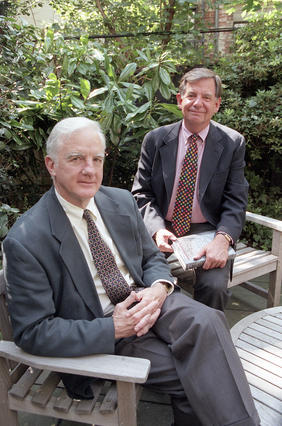
NEW YORK — William G. Bowen, a distinguished and influential educator who pressed elite colleges to give preference to poor and minority applicants, oversaw the first admission of women to Princeton, and expanded the university academically, died Thursday at his home in Princeton, N.J. He was 83.
The cause was colon cancer, a university spokesman said.
As its popular provost and then president, Mr. Bowen was credited with transforming Princeton from a fusty, predominantly white male preserve to a more diverse and inclusive institution.
He was also a folksy presence on its New Jersey campus, often seen in sneakers or riding his bicycle. The first member of his family to attend college, he was, at 31, among the youngest full professors in Princeton’s history, and even as an administrator he continued to teach freshman economics.
He was later president of the Andrew W. Mellon Foundation, leading its support for cultural institutions, the humanities, and higher education.
Mr. Bowen was named provost in 1967 during a tumultuous transition to coeducation under Robert F. Goheen, the president at the time. As Goheen’s successor, from 1972 to 1988, Mr. Bowen pushed for academic and social innovation.
Admitting women and integrating them into campus life — as he had sought to do for blacks, Jews, and other minorities — “came to signify the capacity of a great university to change,’’ he told an interviewer in 2011.
He established residential colleges to give freshmen and sophomores a more cohesive campus experience. He ended the monopoly wielded by aristocratic and expensive eating clubs, the dining and social halls where upperclassmen have their meals, by approving alternatives. And he joined an eventually successful lawsuit against clubs that refused to admit women.
Mr. Bowen also increased the size of the Princeton faculty by more than 60 percent, expanded the physical campus, and completed a $410 million fund-raising campaign that drew contributions so quickly its goal was increased twice.
He was a fierce defender of the First Amendment’s guarantee of freedom of speech, and particularly its exercise on college campuses.
“We don’t invite people here because we agree with them,’’ he told The New York Times in 1987. “The right question, well phrased, can be far more effective than preventing people from speaking.’’
In 1973, he defended a Princeton student group’s invitation to Dr. William Shockley, a physics professor from Stanford University who maintained that blacks were genetically inferior.
He opposed politically motivated boycotts by academic groups — against Israeli speakers or institutions, for instance. And though he publicly opposed apartheid, he rejected demands that universities divest their portfolios of holdings in companies that did business in South Africa.
In an opinion article in The Washington Post in 2015, Mr. Bowen wrote:
“Taking an institutional stand on political issues of many kinds threatens the primary educational mission of the university, which is to be avowedly open to arguments of every kind and to avoid giving priority to partisan or other political viewpoints. The university should be the home of the critic — indeed, the home of critics of many different persuasions — not the critic itself.’’
Mr. Bowen wrote or co-wrote nearly two dozen books, some supported by Mellon, that helped define the nation’s academic agenda. Among his most influential was “The Shape of the River: Long-Term Consequences of Considering Race in College and University Admissions’’ (1998), which he wrote with Derek Bok, the former president of Harvard.
Mr. Bowen wrote in a letter to The Times in 2015: “Minority students admitted as undergraduates to selective institutions consistently graduate at higher rates than do peers with similar qualifications who attend less-demanding institutions. And available evidence indicates that the great majority of beneficiaries of affirmative action go on to enjoy successful careers and live lives enriched by civic contributions.’’
In “Equity and Excellence in American Higher Education’’ (2005), which he wrote with Martin A. Kurzweil and Eugene M. Tobin in collaboration with Susanne C. Pichler, Mr. Bowen contended that in giving preferences in admissions — to children of alumni or to racial minorities, for example — top colleges and universities had neglected low-income applicants and had thus remained “bastions of privilege’’ rather than becoming “engines of opportunity.’’
Still, though he and his colleagues favored a form of affirmative action for low-income applicants, they argued that economic status should not replace race and ethnicity as a preference. With far more whites than minorities among the least affluent families, they wrote, the proportion of minority students would shrink if affirmative action on the basis of race and ethnicity was abolished.
In “The Game of Life: College Sports and Educational Values’’ (2001), Mr. Bowen and his coauthor, James L. Shulman, urged that athletics be better integrated into the educational mission of colleges.
William Gorden Bowen was born on Oct. 6, 1933, in Cincinnati, the son of Albert Bowen, a calculating-machine salesman, and the former Bernice Pomert.
He went there after earning his bachelor’s degree in economics in 1955 from Denison University in Granville, Ohio, where he played championship tennis. After receiving his doctorate at Princeton, the university hired him as an assistant professor and promoted him to full professor in 1965.
From 1964 to 1966 he was director of graduate studies at the Woodrow Wilson School of Public and International Affairs at Princeton.
He married Mary Ellen Maxwell, whom he had met when they were in the fourth grade. He leaves her, along with a daughter, Karen Bowen-Imhof; a son, David; and five grandchildren.



